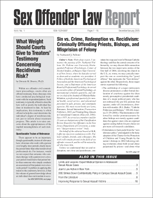Revenge Porn Is Not Free Speech
Author: Roslyn K. Myers, Ph.D., J.D..
Source: Volume 21, Number 04, June/July 2020 , pp.51-52(2)

< previous article |next article > |return to table of contents
Abstract:
This article continues the discussion about nonconsensual dissemination of explicit material, which began in the April/May 2020 issue of Sex Offender Law Report (“Revenge Porn Mistaken for Free Speech in Illinois and Minnesota Cases,” https://www.civicresearchinstitute.com/online/article_abstract.php?pid=7&iid=1427&aid=9287). Recent cases have shown the circuitous route by which courts have arrived at the First Amendment when evaluating the widespread dissemination of sexually explicit images or other material that, whatever it “expresses,” does not contain or embody the ideas, opinions, thoughts, or other communications of the recipient. Victims think of revenge porn as a virtual form of rape. Some lawyers have suggested that the best legal framework for sexually explicit messages shared with an intimate is copyright law. This article examines the misapplication of free speech analyses as a result of the law’s failure to keep pace with advancing technology. The article concludes that, in developing appropriate legislation, the core violation—the lack of the individual’s consent—should be the focus in lawsuits arising from revenge porn.Keywords: Nonconsensual Publication of Explicit Images; Illinois v. Austin; March Against Revenge Porn
Affiliations:
1: John Jay College.